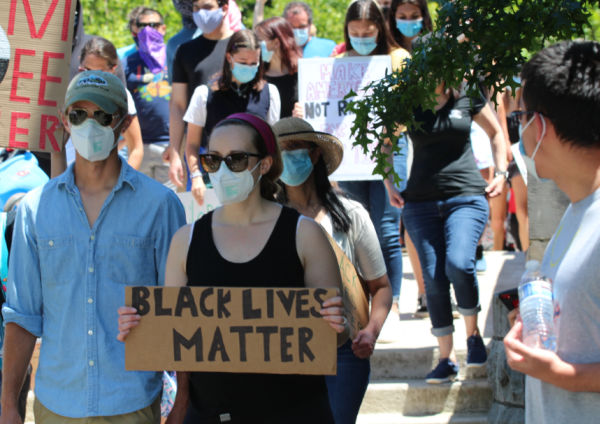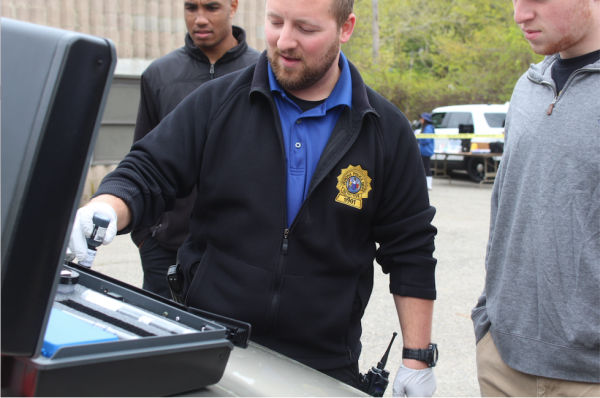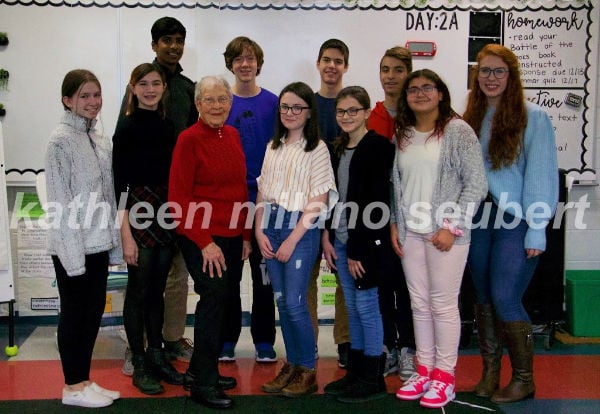
Earlier this summer, Marwa Elessawy, a 2018 graduate of Verona High School, circulated a petition to “advance racial justice” in Verona schools. Though such a petition is not legally binding on the school district, Elessawy, who was one of the speakers at Verona’s march for Black Lives Matter in June, intends to present it to the Board Of Education at its Tuesday, July 28 meeting.
The petition, which demands curriculum and hiring changes, might seem to be introducing something new to Verona. Yet even before the deaths of George Floyd, Breonna Taylor and Ahmaud Arbery sparked a national re-examination of the treatment of Black people in America, race and social justice were part of the curriculum in Verona. Under a state mandate that dates to 2002, Verona added elements of Black history to a wide range of history and social studies classes, as well as literature classes.
There are books on diversity and books by Black authors in all Verona school libraries, and they are actively used. The district has done diversity training in the past and has put resources in place for more now. Verona’s superintendent, Dr. Rui Dionisio, is recruiting volunteers for an action committee to review current diversity initiatives in the schools and suggest improvements. And this summer, both Verona’s teachers’ union and the school administration have created book clubs on anti-racism and anti-bias books.
“Are there gaps? Certainly,” says Charles Miller, director of curriculum, instruction, and assessment for Verona’s public schools. “There are gaps in every district in New Jersey. You identify the gaps and you shrink them.”
For the school district, the shrinking process was spurred by New Jersey’s Amistad Mandate, named for a ship involved in an 1839 slave revolt. It requires schools to teach about topics that many parents may not have learned when they were in school: the African slave trade, slavery in America, the many contributions that Black people have made to American society, the impact of criminal justice and human rights.

At VHS, it is taught through U.S. History I and II, AP U.S. History, Constitutional & Trial Law, and Contemporary Issues. The Criminal Justice class at VHS has had substantive discussions about stop-and-frisk policies that disproportionately affect communities of color, and brought in Verona Police Department officers to talk about the use of force by law enforcement. Verona elementary schools talk about tolerance, diversity and community beginning in kindergarten. At H.B. Whitehorne Middle School, fifth graders learn about the trans-Atlantic slave trade and Native American history, while sixth graders study the Civil War and Reconstruction. “You can’t understand the challenges of American history without understanding slavery,” says Steven Schels, Verona’s supervisor of humanities.
Elassawy’s entire time in Verona schools was under the Amistad Mandate, but she says it wasn’t enough. “All of it is white-washed,” she says, “and the atrocities of this country have been watered down.”
Before George Floyd was killed, the New Jersey Department of Education had opened an audit–called QSAC–of how well Verona is teaching the Amistad Mandate, something that happens every three years. “Reviews are just good practice,” says Schels, adding that it is even more important now. “The events that have happened need all of us to reflect.”
Some of those reflections have already happened in classes. Miller says that sixth graders were asked to explore what connections might exist between the protests that followed Floyd’s death and other protests in American history, such as the Boston Tea Party, and the threats to tar and feather tax collectors in the years leading up to the Revolution. He says that there was pushback from some Verona parents about the assignment, which he chalked up to a misunderstanding about the purpose of the work.
“When we were kids, we read from one book,” Miller says. “Now there is so much information.” A document-based question (DBQ) assignment like the one the sixth graders got asks students to identify a point of view or an argument, and then to compare two primary sources to support their own thesis. “Students need to read through it all to understand,” Miller says.

Some reflections will be happening within the teaching and administrative staffs. Verona’s teachers’ union, the Verona Education Association, has started a book club around Ibram X. Kendi’s book “How To Be An Anti-Racist” and school administration has a separate book club on “Biased: Uncovering the Hidden Prejudice That Shapes What We See, Think, and Do,” by Jennifer Eberhardt. Verona will also be using some of the free resources from Teaching Tolerance, a project of the Southern Poverty Law Center. The program uses webinars, podcasts and more to talk to teachers about anti-bias and social justice approaches in education. Free resources like Teaching Tolerance are important right now, when Verona’s schools face increased spending to safely re-open in the fall.
And while the Amistad Mandate applies only to social studies, Verona has already implemented its principles in English classes and plans to do more. Currently, VHS students can also take a Seton Hall University dual-enrollment class, English IV: Race, Culture & Identity, and two Syracuse University dual-enrollment classes on multiculturalism, Honors Writing Culture: Intro to Creative Nonfiction and Honors Class and Literary Theory. This summer, Miller will seek BOE approval for English 4 to spend a full half year on Black literature. All VHS students must take English 4 to graduate. “This is not an elective,” Miller stresses.
(This summer, Verona is making curriculum changes to comply with a new state mandate to teach middle school and high school students about the political, economic, and social contributions of lesbian, gay, bisexual, and transgender individuals, as well as people with disabilities. Miller expects to have a parent workshop around the new curriculum, and there will be professional development workshops for teachers and staff.)
“We want to have honest and open discussions,” says Schels, “to be able to say we are proud of how we are working not just to meet a mandate, but to honestly teach.”

